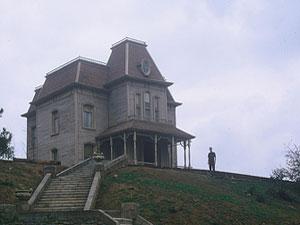Why is “Psycho” so scary?
(Image by dahnielson (cc:by-nc-sa))
This story was originally covered by PRI’s Studio 360. For more, listen to the audio above
It was 50 years ago on June 16, 1960, that audiences were first introduced to Alfred Hitchcock’s Psycho. Since then, slasher and stalker flicks have become commonplace and directors have continually pushed the bounds of how to frighten audiences. Psycho, however, has been somehow able to remain scary as ever.
“The real breakthrough of the film was not the notorious shower scene,” Mary Harron, director of the film American Psycho, told PRI’s Studio 360, “but rather sitting us down at the table with a madman and making us care about him.” Anthony Perkins’ portrayal of the psychopathic Norman Bates is truly unsettling, partly because of how vulnerable and charming he is.
“Instead of clearly defined villains — Nazis, gangsters, or ghouls,” Studio 360’s Sarah Montague explains, “the thing to fear is the boy next door.”
The banality of evil in Psycho spawned a host of derivative films, helping audiences be afraid of camp counselors, dates, and neighbors. “Great horror films, you know, infect you,” according to Harron. “After you’ve seen something, you never kind of do a normal thing again.”
For example, checking into a motel. Today’s motels are inextricably linked to the Bates Motel in the film, taking on an air of danger. Psycho wasn’t the first horror film to be set in a motel, but it was definitely the most iconic.
“You could see the desires of consumer culture to make their hotels attractive and safe places as connected to American innocence,” David Laderman, author of Driving Visions told Studio 360. Psycho is “a movie that tells you, well you’ve got to think twice.”
Motels are a place where people can be anonymous. In a romantic comedy, that can be fun. In film noir, it can be dangerous. Even today, Laderman says, “It’s very scary, I think, be spending the night be living with that kind of open access.”
After all, as Norman Bates said, “we all go a little mad sometimes.”
PRI’s Peabody Award-winning “Studio 360 with Kurt Andersen” from WNYC is public radio’s smart and surprising guide to what’s happening in pop culture and the arts. Each week, Kurt Andersen introduces you to the people who are creating and shaping our culture. Life is busy — so let “Studio 360” steer you to the must-see movie this weekend, the next book for your nightstand, or the song that will change your life.
